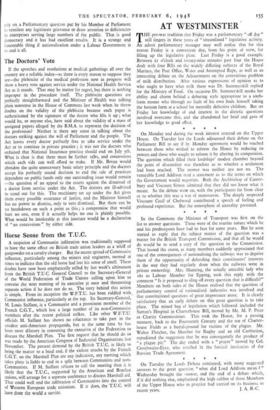AT WESTMINSTER
THE pre-war tradition that Friday was a parliamentary " off day " still lingers in these years of " streamlined " legislative activity. An adroit parliamentary manager may well realise that for this
reason Friday is a convenient day, from his point of view, for filling up the legislative plate. Last Friday is a good example. Between it o'clock and twenty-nine minutes past four the House dealt with four Bills on the widely differing subjects of the Royal Marines, the Post Office, Water and Attempted Rape, as well as an interesting debate on the Adjournment on the contentious problem of milk distribution. After various expressions of opinion as to who ought to have what milk there was Dr. Summerskill replied for the Ministry of Food. On occasion Dr. Summerskill masks her ability and charm behind a debating style appropriate to a sixth- form master who through no fault of his own finds himself taking the bottom form at a school for mentally defective children. But on Friday her knowledge of and interest in the dietetic questions involved overcame this, and she abandoned her brief and gave of her knowledge to good effect.
* * On Monday and during the week interest centred on the Upper House. On Tuesday last the Lords adjourned their debate on the Parliament Bill to see if by Monday agreement would be reached between those who wished to reform the House by reducing its powers and those who sought to reform it by altering its composition. The question which filled their lordships' modest chamber beyond the point of discomfort was therefore as to whether a settlement had been reached. The answer was neither aye nor no. The venerable Lord Addison read a statement as to the terms on which the Government would negotiate. Both the Archbishop of Canter- bury and Viscount Simon admitted that they did not know what it meant. So the debate went on, with the participants far from clear as to whether this was a war of manoeuvre. The deeply respected Viscount Cecil of Chelwood contributed a speech of feeling and profound experience. But the atmosphere of unreality persisted.
* * * * In the Commons the Minister of Transport was first on the list to answer questions. These were of the routine nature which he and his predecessors have had to face for some years. But he soon started to reply that the subject matter of the question was a matter for the British Transport Commission, and that all he would do would be to send a copy of the question to the Commission. That loosed the storm, as many members suddenly appreciated that one of the consequences of nationalising the railways was to deprive them of the opportunity of defending their constituents' interests in the way they had regularly done when the railways were in private ownership. Mrs. Manning, the usually amicable lady who sits as Labour Member for Epping, took this reply with the comment " Is it proposed to sling off every question that is difficult?" Members on both sides of the House realised that the question of parliamentary control of nationalised industries was involved and that constitutional questions of great importance arose. It is clearly satisfactory that an early debate on this great question is to take place. The mixed bag of legislation which followed included the Sutton's Hospital in Charterhouse Bill, moved by Mr. M. P. Price as Charity Commissioner. This took the House, for a passing moment, back to the Fourteenth Century and the use of Charter- house Fields as a burial-ground for victims of the plague. Mr. Walter Fletcher, the Member for Rugby and an old Carthusian, repudiated the suggestion that he was consequently the product of " a plague pit." The day ended with a " prayer " moved by Col. Crosthwaite-Eyre, who revelled in the farcical intricacies of the Russian Trade Agreement.
* * On Tuesday the Lords Debate continued, with many suggested answers to the great question " what did Lord Addison mean ? " Wednesday brought the answer, and the end of a debate which, if it did nothing else, emphasised the high calibre of those Members of the Upper House who in practice had carried on its business in






























 Previous page
Previous page